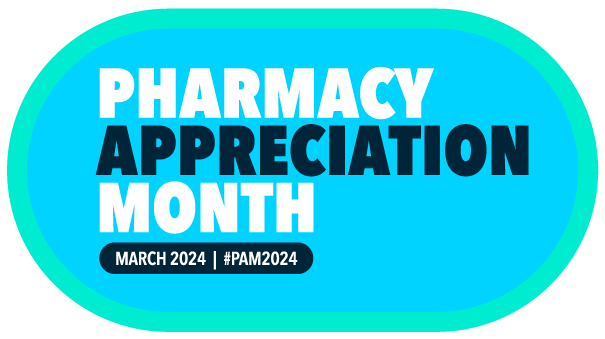Pharmacy Check-in: Camille Gagnon

Camille Gagnon, PharmD, MSc (she/her)
Assistant Director, Canadian Medication Appropriateness and Deprescribing Network
Montreal, QC
Camille has been the Assistant Director at the Canadian Medication Appropriateness and Deprescribing Network (CADeN) since 2017. CADeN's mission is to make medication use safer for all Canadians by eliminating harmful effects caused by medications. Alongside a dedicated team, Camille contributes to the development, planning and coordination of the network's health promotion and research efforts. To increase the impact of CADeN’s initiatives, Camille facilitates collaboration between many network partners, including members of the public, patient partners, healthcare professionals, researchers and policy makers. Camille's day-to-day activities include preparing communications to raise awareness of safe drug use, developing and disseminating tools for professionals to facilitate deprescribing and supporting committees and research projects run by the network team and its members.
Before joining the network, Camille worked as a community pharmacist, as well as in a family medicine group in Ottawa and Montreal. It was while working as a pharmacist on a multidisciplinary team assessing patients with suspected cognitive impairment that she saw the potential of deprescribing to improve people's quality of life. Camille also worked in clinical program management in the private insurance sector, where she learned about the different realities, and inequalities, of access to prescription drugs across the country. Camille has also taught pharmacology to future pharmacy technicians. She holds a Master's degree in Public Health from the École de santé publique de l'Université de Montréal, which has enabled her to discover the great value of prevention and promotion interventions for improving health in the long term.
Q&A with Camille
We caught up with Camille during Pharmacy Appreciation Month to talk about her role in public health and research, and what the power of pharmacy means to her.
This year’s Pharmacy Appreciation Month (PAM) theme is “The power of pharmacy.” What does that mean to you?
The "power of pharmacy" is incredible! Just think of the adverse effects caused by drugs, which can, at best, have disturbing consequences for patients, and at worst, put their health at risk. Pharmacists are the professionals best situated to recognize these adverse effects and put forward a course of action to treat them, and even better, in many cases, prevent them. Timely intervention makes all the difference! By making our expertise and activities (our "power"!) better known to the general public and other health-care professionals, we'll have more opportunities to make that difference. It's a wheel that turns!
One of the most exciting things about a career in pharmacy is the variety of roles pharmacists take on and the impact they can have in so many different ways. Tell us about your role and what makes it unique?
As a pharmacist working in public health and research, I'm fortunate to work with a wide range of individuals and organizations with different experiences and perspectives on medicines and how they are used. This is extremely rewarding! It has enabled me to develop a more global perspective on these issues over time. To promote deprescribing and influence the way medicines are used, we need to understand the health needs and motivations of those involved (e.g., prescribers, patients, etc…), but also the huge impact of health inequalities.
Medicines are the heart of modern health care. Pharmacists are well trained to support their patients through their individual care pathways. Yet there are very few pharmacists working in public health, despite the huge opportunities for them to help improve health at a population level!
What inspired you to take on this role? What makes it rewarding?
Seeing the positive impact of deprescribing on patients' health on an individual basis first inspired me to get involved in a network whose mission was to make it more accessible and concrete for patients and health-care professionals alike.
The network gives me the opportunity to rub shoulders with a variety of passionate people, including many who get involved on a completely voluntary basis. I learn a lot from everyone I meet and I'm very grateful for this opportunity.
What is one practice area where you feel pharmacists could increase their role that would lead to better patient outcomes?
Of course, my work with the network has led me to take an interest in the role pharmacists can play in preventing, recognizing and managing adverse drug reactions. Needless to say, pharmacists already do a great deal in this respect! But there are opportunities to develop our role even further.
First of all, to ensure the safe use of medications, pharmacists need to be particularly alert to situations where there is a high risk for medication errors (e.g., care transitions), and rely on outstanding communication (interprofessional, as well as with patients and their families).
Pharmacists can also make a difference by systematically communicating the possible adverse effects of pharmacological treatment to patients and their families, as well as the anticipated duration of treatment. In the case of medications indicated for short-term use, such as sleeping pills or proton pump inhibitors, we can better communicate the recommended duration of use of these agents, and talk about deprescribing them at this point, to sow the seed and prepare the patient. When we know that many patients in Canada end up using these agents chronically and without indication, this intervention can make a difference.
Finally, all pharmacists can show leadership in their practice environment and contribute to the body of knowledge on drugs by ensuring that adverse drug reactions experienced by their patients are reported to Health Canada, especially when these side effects are serious or unexpected.
What is one thing you wish all patients knew about what pharmacists can do?
I'd like all patients to know that there are no inappropriate or unnecessary questions to ask the pharmacist about medication—to keep the communication channel open and transparent. There are many unfortunate situations associated with medication that can be avoided with the right question at the right time (e.g., inadvertent duplication or omission of a dose, undetected side effects, interactions with an over-the-counter product not mentioned for fear of judgment or disapproval). Pharmacists can be true allies of the saying, "Prevention is better than cure," so talk to them!
What makes you proud to be a pharmacist?
I'm proud to see what an essential role pharmacists play as leaders and members of the Canadian Medication Appropriateness and Deprescribing Network! This is a reflection of the key role they play in promoting safe medication use.
Pharmacists are creative: they invent tools to help health-care professionals deprescribe safely and change practices!
Pharmacists are innovative: they develop research projects that answer important questions, such as, how can we eliminate barriers to the appropriate use of medications?
Pharmacists are inspirational: they are leaders who deliver a sensitive and thoughtful message on the issues of overprescribing and polypharmacy, and who encourage others to get involved!
In short, how can you not be proud?

